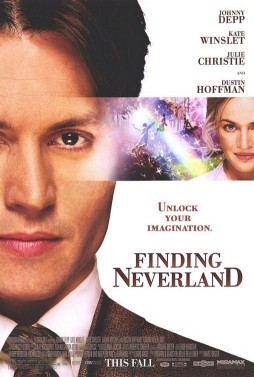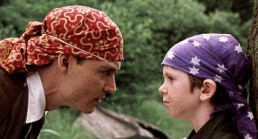|
Finding
Neverland
It’s indelible that the buzz of “award potential”
would start humming no matter what project Marc Forster
decided to undertake following his 2002 Academy Award nominated
effort, Monster’s Ball. Remember,
that film won Halle Berry the Oscar for Best Actress, and
the film itself was nominated for Best Screenplay, so it’s
not surprising that the murmurs have already begun for his
latest film, Finding Neverland.
Neverland
stars Johnny Depp as J.M. Barrie and the film chronicles
the life of the author leading up to the creation of his
most remembered work, Peter Pan.
I have
to admit that it usually makes me a bit uncomfortable when
a film begins with the preface, “Based on True Events”
as Neverland does. I don’t know exactly why,
but this puts me on the defensive for some reason.
The
Coen Brothers played with the notion of “truth”
in Fargo by including a title card boasting that
the fictional film was in fact “Based on a true story.”
They also toyed with this in O Brother, Where Art Thou?
by stating that the film was based on Homer’s “Odyssey”
all the while claiming that they had never in fact read
Homer’s epic poem.
So what
is so off-putting by this premise? Perhaps its cynicism,
maybe it’s just the posturing implied by such a title.
Who knows?
What
is known is that Depp’s portrayal of J.M. Barrie completely
won me over despite the inclusion of said statement. I don’t
know if any of what is covered in Forster’s film is
falsified, but truthfully I want to believe every moment
of it.
We open
with the failure of Barrie’s latest work, a play that
is immediately fouled for being too droll for even the drollest
lot of London’s wealthy upper crust. He suspects the
play to be a failure before the first act has drawn to a
close on opening night, and we suspect trouble brewing between
him and his aspiring socialite wife Mary (Rhada Mitchell)
when we learn that they actually sleep in separate bedrooms.
Barrie
dives into his writing with daily visits to a local park
with his dog. Upon one visit he becomes acquainted with
the widowed Sylvia Llewelyn Davies (Kate Winslet) and her
four sons: George, Jack, Peter, and Michael.
Barrie
decides to offer his services in entertaining the boys,
but becomes fascinated with the family when he learns that
young Peter has completely given up on imagination. Being
forced to deal with mortality at such a young age with the
death of his father, Peter has completely turned off from
fantasy seeing it as nothing but lies and silliness.
As one
could surmise, Barrie’s repeat visits with the family
result in peeks at the inspirations that prompt the author
to construct a life long fairy tale about adolescence, adulthood,
and the loss of innocence surrounding a boy who refused
to grow up. What
is surprising is that the film does not appear to take these
moments of inspiration lightly.
We’ve
seen this concept once before in John Madden’s Oscar
behemoth Shakespeare in Love. The difference here
is that Madden’s film took Shakespeare in theme and
applied it in situational doses. In
that film we witnessed moments of possible influence for
the Bard’s future works, but these were all suspected
inference and often meant more for our enjoyment as young
William cannot see the relevance of each occurrence as we
do.
Barrie’s
moments of inspiration are far different. Forster’s
film is working up to a specific work, the play known as
Peter Pan, and so each flash of muse fits into the finished
work in some fashion. What works here is the manner in which
this is achieved because each one is not implemented verbatim
into the finished work.
We get
a firsthand look at the process of writing, as Barrie pulls
from his own experiences with death and loss and siphons
it all through young Peter’s brush with mortality
and grief. We even jump from “reality” to “imagination”
in such a way that lends insight into the origins of some
of Barrie’s characters in the play.
The
film is far darker in tone than one might initially expect
from such fare. Sure, it doesn’t plumb the depths
of the human soul, but Forster doesn’t shy away from
the inevitable claims of Barrie’s probable affair
with Sylvia or the suggestion of his dalliances with the
boys themselves. Granted,
these taboo subjects do not receive as much focus as they
could have, but its enough to setup the issues surrounding
Barrie’s life at that time.
One
aspect that seems to resonate through the film is the magic
involved in realization. In one scene Barrie points out
to George that in an instant he has transformed from a child
to an adult. “The boy is gone,” he tells him.
This
is all contrasted with the impending production of “Peter
Pan” for the first time. Barrie convinces his producer
Charles Frohman (Dustin Hoffman) to back his next play which
will center on pirates, Indians, crocodiles, flying children,
and fairies, while trying to persuade actors to go along
with all of his absurd notions.
How
thrilling must it have been to witness the moment of transformation
in Barrie’s play from what appeared to be an utterly
maniacal into what is inarguably genius?
Undoubtedly,
there are bound to be J.M. Barrie aficionados who will criticize
and fault the film with inaccuracies, this is to be expected.
However, the film does an admirable job presenting the spirit
behind story. There is no doubt that the film is laden with
liberties regarding the depiction of truth, the question
is whether or not it faults the overall experience and the
message therein. It doesn’t.
It’s
unsure whether or not Finding Neverland will garner
any nominations come “Award Season” and over-hype
could certainly sink this one if it’s not careful,
however the chances are likely that it will garner nominations,
especially for Depp.
Rating:

|







